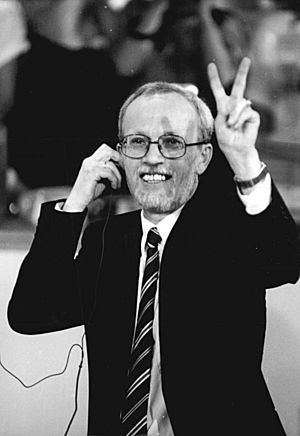Lothar de Maizière facts for kids
Quick facts for kids
Lothar de Maizière
|
|||||||||||||||||||||||||
|---|---|---|---|---|---|---|---|---|---|---|---|---|---|---|---|---|---|---|---|---|---|---|---|---|---|

de Maizière in the aftermath of the 1990 East German general election
|
|||||||||||||||||||||||||
| Minister for Special Affairs | |||||||||||||||||||||||||
| In office 3 October 1990 – 17 December 1990 Serving with Rudolf Seiters, Hans Klein, Sabine Bergmann-Pohl, Günther Krause, Rainer Ortleb, Hansjoachim Walther
|
|||||||||||||||||||||||||
| Chancellor | Helmut Kohl | ||||||||||||||||||||||||
| Preceded by | Position established | ||||||||||||||||||||||||
| Succeeded by | Position abolished | ||||||||||||||||||||||||
| Minister-President of East Germany | |||||||||||||||||||||||||
| In office 12 April 1990 – 2 October 1990 |
|||||||||||||||||||||||||
| Head of state | Sabine Bergmann-Pohl (interim) | ||||||||||||||||||||||||
| Deputy | Peter-Michael Diestel | ||||||||||||||||||||||||
| Preceded by | Hans Modrow (as Chairman of the Council of Ministers) | ||||||||||||||||||||||||
| Succeeded by | Helmut Kohl (as Chancellor of Germany) | ||||||||||||||||||||||||
| Minister of Foreign Affairs | |||||||||||||||||||||||||
|
Acting
|
|||||||||||||||||||||||||
| In office 20 August 1990 – 2 October 1990 |
|||||||||||||||||||||||||
| Minister-President | himself | ||||||||||||||||||||||||
| Preceded by | Markus Meckel | ||||||||||||||||||||||||
| Succeeded by | Position abolished | ||||||||||||||||||||||||
|
|||||||||||||||||||||||||
|
|||||||||||||||||||||||||
| Personal details | |||||||||||||||||||||||||
| Born | 2 March 1940 Nordhausen, Province of Saxony, Free State of Prussia, Nazi Germany (now Thuringia, Germany) |
||||||||||||||||||||||||
| Political party | Christian Democratic Union (1990–present) | ||||||||||||||||||||||||
| Other political affiliations |
Christian Democratic Union (East Germany) (1956–1990) | ||||||||||||||||||||||||
| Children | 3 | ||||||||||||||||||||||||
| Residence | Berlin | ||||||||||||||||||||||||
| Alma mater | Hochschule für Musik Hanns Eisler Berlin Humboldt University of Berlin |
||||||||||||||||||||||||
| Occupation |
|
||||||||||||||||||||||||
| Signature | |||||||||||||||||||||||||
|
Other offices held
1990–1991: Deputy Chairman, Christian Democratic Union
1990–1991: Chairman, Christian Democratic Union of Brandenburg 1989–1990: Chairman, Christian Democratic Union (East Germany) |
|||||||||||||||||||||||||
Leader of East Germany
|
|||||||||||||||||||||||||
Lothar de Maizière (born 2 March 1940) is a German former politician. In 1990, he led the first and only democratically elected government of East Germany. He held this important role during the final months before German reunification. After Germany became one country again, he briefly served as a minister in the new government.
Contents
Family Background and Heritage
Lothar de Maizière comes from a French family called Huguenots. They were Protestants who had to leave France in the late 1600s because of religious persecution. His family found safety in Prussia, which is now part of Germany. They kept their French culture and language for many generations.
His father, Clement de Maizière, was a lawyer. Lothar's family has many members who have been important in German public life. His uncle, Ulrich de Maizière, was a top military officer in West Germany. His cousin, Thomas de Maizière, became a key politician in unified Germany. He served as a close advisor to Chancellor Angela Merkel.
Early Life and Education
Lothar de Maizière was born in Nordhausen, Thuringia. He attended a historic school in Berlin called the Berlinisches Gymnasium zum Grauen Kloster. He was one of the last students before the school closed in 1958.
From 1959 to 1965, he studied the viola at the Hanns Eisler College of Music in East Berlin. He played in the Berlin Symphony Orchestra. Later, he studied law through distance learning at the Humboldt University of Berlin. He completed his law studies in 1975.
Political Career
Lothar de Maizière was a long-time member of the Christian Democratic Union (CDU) in East Germany. He became well-known during the big political changes after the fall of the Berlin Wall in 1989. He helped remove the old party leaders who supported the Communist government. This helped the CDU become a truly independent party.
He was elected as the party chairman in November 1989. He became a leading figure in East Germany's move towards democracy. In March 1990, East Germany held its first and only free election. The CDU and its allies won, and Maizière became a key leader in the new government.
Leading East Germany to Unity
After the election, Maizière became the Premier of East Germany. He held this position from 12 April to 2 October 1990. His government focused almost entirely on reuniting East and West Germany. He worked closely with the West German government, led by Chancellor Helmut Kohl.
As Premier, Maizière signed the "Two Plus Four Agreement." This important treaty officially ended the rights of the Allied powers in Germany after World War II. It also set the legal steps for Germany to become one country again. These actions led to East Germany joining the Federal Republic of Germany on 3 October 1990.
Resignation from Office
After Germany was reunified, Maizière joined the federal government. He became the Minister for Special Affairs in Chancellor Kohl's cabinet. This role was meant to represent the newly joined eastern states.
However, his political career ended just a few months later. On 17 December 1990, Maizière resigned. This happened after allegations surfaced that he had provided information to the East German secret police, known as the Stasi. These reports caused disappointment, especially given his important role in bringing democracy to East Germany.
See also
 In Spanish: Lothar de Maizière para niños
In Spanish: Lothar de Maizière para niños
 | Precious Adams |
 | Lauren Anderson |
 | Janet Collins |

